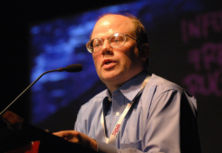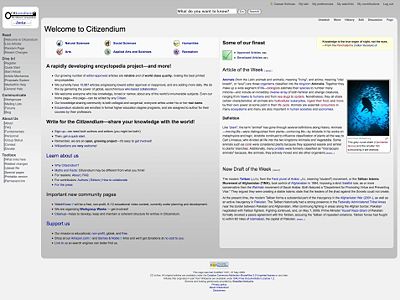Citizendium: Difference between revisions
imported>Ro Thorpe m (→Article Approval: it's not compulsory...) |
imported>Hayford Peirce (→Article Approval: clarified the concept) |
||
| Line 27: | Line 27: | ||
===Article Approval=== | ===Article Approval=== | ||
Citizendium requires that its articles be approved by experts familiar with the subject matter. Prior to approval, articles may be readily developed by any Citizendium participant. Upon approval, articles become the default article served to readers. Approved articles are not directly edited; instead, contributors are able to improve a draft version of the article. | Citizendium requires that its finished articles be approved by experts familiar with the subject matter. Prior to approval, articles may be readily developed by any Citizendium participant. Upon approval, articles become the default article served to readers. Approved articles are not directly edited; instead, contributors are able to improve a draft version of the article. | ||
===Real Names=== | ===Real Names=== | ||
Revision as of 13:23, 23 December 2007
The Citizendium (sit-ih-ZEN-dee-um, "a citizens' compendium of everything") is an experimental wiki-based encyclopedia project spearheaded by Larry Sanger, co-founder of Wikipedia, former editor-in-chief of Nupedia, and consultant to other web-encyclopedia projects such as the Encyclopedia of Earth. The project aims to improve on the Wikipedia model by requiring all contributors to do so with their real names, by strictly moderating the project for unprofessional behaviors, and by providing what it calls "gentle expert oversight" of everyday contributors. It was first envisioned as a complete "fork" of the English Wikipedia, but the project abandoned that idea prior its public launch to emphasize its own original articles, although quality Wikipedia articles can still be imported as starting points for improved articles. A main feature of the project is its "approved articles", which have each undergone a form of peer-review by credentialed topic-experts and are closed to real-time editing. The project will be carried out under the auspices of the Citizendium Foundation, although it is still phased under the Tides Center as an incubator project. Citizendium was introduced as a beta project in March 25, 2007, from which it has yet to emerge.
Origin of Citizendium

Larry Sanger announced the concept for Citizendium on September 15, 2006 at Berlin's Wizards of OS 4 conference. The project moved on to a pilot phase in October, and formally launched on March 25, 2007.
Like Wikipedia, Citizendium is a project to prepare an encyclopedia through the collaborative writing approach known as wiki. The first recognized wiki was created by Ward Cunningham, who began development of WikiWikiWeb in 1994.[1]
Fundamental Principles
Citizendium was founded on the following organizational principles that, for the most part, distinguish it from Wikipedia.
Open Collaboration
Citizendium is similar to Wikipedia in that it is an open wiki: the public is invited to participate and edit most pages.
Expert Contribution
Unlike Wikipedia, Citizendium emphasizes the involvement of experts. While articles may be developed and revised by all Citizendium participants, the project places certain decisions in the hands of subject experts. (See Article Approval, below.)
Sanger promotes the shift to expertise, saying: "people who know a great deal about a subject, who are recognized by various societal mechanisms for that knowledge, can add a great of value to Web 2.0 projects, if they are given special roles that recognize their expertise."[2] Using a metaphor from Eric S. Raymond's story about The Cathedral and the Bazaar, Sanger suggests that we "Think of editors as the village elders wandering the bazaar and occasionally dispensing advice and reining in the wayward. Their presence is merely a moderating, civilizing influence. They don't stop the bazaar from being a bazaar."[3]
Article Approval
Citizendium requires that its finished articles be approved by experts familiar with the subject matter. Prior to approval, articles may be readily developed by any Citizendium participant. Upon approval, articles become the default article served to readers. Approved articles are not directly edited; instead, contributors are able to improve a draft version of the article.
Real Names
Citizendium requires, with limited exceptions, that authors and other participants use their real names. Sanger has stated that real names, in contrast to the pseudonyms common on Wikipedia, would add to the credibility and accuracy of Citizendium articles. Though the requirement for real names limits the level of participation (see Criticisms section), Citizendium officials believe that people act in a more responsible manner when their name is on the line. Accordingly, this policy seeks to foster a culture of accountability and professionalism.
Project Goals
Neutrality
Citizendium has adopted a Neutrality Policy[4] that is based on an early version of Wikipedia's neutrality policy (circa December 2001), which had been drafted by Sanger.
The Citizendium neutrality policy sets out the following outline for neutrality in encyclopedias:
- Reduction of Bias: It is accepted that there are many different viewpoints of topics all around the world by different people, and as such there is no "Correct" viewpoint but "accurate" viewpoints. In this sense it's the responsibility to provide comprehension and fairness to all topics and viewpoints regardless of personal belief or feelings. Unfortunately it is impossible to reduce the amount of bias to zero, but the policy does indicate that recognition of bias is beneficial to the project.
- Facts vs Opinion: The project has a responsibility to produce articles based on established and attributable fact. However it also should be noted that while this dissuades opinion, the guidelines deem it not irresponsible to produce facts about all opinions on a subject, provided they can be resourced, acknowledged, and attributed by fact.
- Fairness and Sympathy: Every position must be represented as plausible. It is recommended that this be implemented by use of a consistently positive tone when representing viewpoints. Conceptually, it's suggested that it is unfair to highlight one viewpoint over another, exclusively represent one viewpoint, or to exclusively not represent one viewpoint. Omission of viewpoints can have the same effect as exclusivity.
Responsibility
Responsibility covers a broad scope within this project. Not only do members have responsibilities to the project and its contributors, but they also are responsible for the content they produce. The project has created policy that determines it will maximize attribution, either to an author or a source.
Additionally, the Citizendium guidelines propose that editors and authors alike have a responsibility to the public at large. It is the duty of all contributors at CZ to ensure that information on an article can be attributed to fact, and does not contain any questionable or unauthorized/copyrighted material, unless that required permission has been specifically granted for our use.
There is also a great importance of projecting reliable information; if Citizendium articles are not accurate then how can the project be credible? The goal is to create a "better free encyclopedia", and its users and content should aim to fulfill that.
Should there be any incident of irresponsibility or abject behavior or content, CZ has processes and policies in place that are able to deal with these in the most professional manner available, and those should be exercised first to prevent user conflict and infighting.
Family-Friendliness
Citizendium has several differences that separate it from Wikipedia.[5] In the preceding article, there are several points that illustrate this aim:
- We will never have nearly as many articles about porn stars and sexual fetishes. We aim to be family-friendly.
- We take defamation seriously. We believe defamation is a horrible thing, and we have zero tolerance for people playing fast and loose with people's reputations in their biography articles. This is why we have a Policy on Topic Informants and a Topic Informant Workgroup.
- We expect professional behavior and have very low tolerance for disruption. Our Constabulary has some pretty firm rules which require professionalism. This means that not only do we have rules against personal attacks, blatant violations of the neutrality policy, and so forth, we actually enforce them. We enforce our rules by warnings (in most cases) followed by permanent bans, which can be rescinded only through appeal or application for reinstatement. We do not have "24 hour bans", which do nothing but annoy and antagonize.
All of these serve to indicate that Citizendium does not wish to harbor content that is morally questionable, or allow disruptive or abusive behavior toward its contributors or against its own community.
Additionally, there is a primer for those who have chosen to migrate from Wikipedia to Citizendium located here. A summarized version of the family-friendly policy can be found here. It is CZ's aim to ensure that all articles about sexual topics will be scholarly and tactful, and none will contain graphic photos.
Governance
The Citizendium's Fundamental Policies[6] describes five guidelines for the governance of the project within its community. They are as follows:
- All contributors to the Citizendium must do so using their real names, unless special and unusual permission is granted by project management.
- The Citizendium will be open to contribution by anyone (tentatively, "authors") who is able to make a positive difference and who is willing to work collaboratively under the policies and management of the project.
- The Citizendium will invite subject area experts to serve as editors.
- The Citizendium will have a set of persons of mature judgment specially empowered to enforce rules, called (at least tentatively) "constables."
- There will be a separation of powers: enforcement officials ("constables") will not be able to make editorial decisions, and editors will not have the ability to enforce their own decisions, though they will be able to make recommendations.
The combination of these guidelines result in a project that while still existing as an "open system", must have attribution, accuracy, and the unbridled freedom for subject matter experts to be a part of the project. However, the problems of pre-existing systems have been acknowledged and solutions to those are qualified by responsible individuals not encompassed by total empowerment.
Online Republic
Sanger has said that he envisions Citizendium as a new sort of internet community, one that contains all the elements of a traditional democratic republic: a constitution, inclusive participatory governance, and an executive, legislative, and judicial branch. A "constitutional convention", has been proposed, and is under consideration for creation when there are sufficient stakeholders involved.
Reception & Criticism
On November 1st, 2007, Citizendium officially turned one-year old. To celebrate its birthday, Sanger produced a press release that presented a narrative snapshot of the current state of the project, in terms of its progress and to debunk some myths about its status. Also, a slashdot post was made to mark the occasion.
References
- ↑ Correspondence on the Etymology of Wiki (November 2003). Retrieved on 09-05-2007.
- ↑ Sanger (2006) Why Make Room for Experts in Web 2.0 Keynote delivered at SDForum, San Jose, California, Oct. 24, 2006, retrieved from http://www.citizendium.org/roomforexperts.html on May 7, 2007.
- ↑ Sanger (2006) The Citizendium FAQ, retrieved from http://www.citizendium.org/faq.html#editors on May 7, 2007.
- ↑ Neutrality Policy (09-05-2007). Retrieved on 09-05-2007.
- ↑ We aren't Wikipedia (23 April 2007). Retrieved on 09-05-2007.
- ↑ Version 1.5 (22 January 2007). Retrieved on 09-05-2007.
